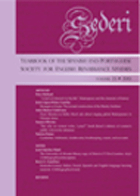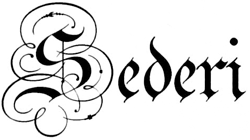
Sederi 23
Sederi 23 — 2013
EDITORS
Berta Cano Echevarría & Ana Sáez-Hidalgo
REVIEW EDITOR
Francisco J. Borge López
ISSN 1135-7789
Susana Oliveira, “’But Why No Women Write, I Pray?’ Sarah Jinner’s Defence of Women’s Public Voice in Her Almanacs.” SEDERI 23 (2013): 79-94.
DOI: https://doi.org/10.34136/sederi.2013.4 Download PDF
Abstract
In seventeenth century England women writers had already been able to move beyond the two genres of writing that had initially been approved for them: translation and devotional literature. It is noteworthy, however, to acknowledge women as authors of almanacs, considering that these writings required a scientific background based upon a specific education in medicine and astrology usually inaccessible to women. Between 1658 and 1664, Sarah Jinner emerged as the first woman author of almanacs. Besides the anticipated prophecies and medical advice, this London astrologer also advocated women’s public voice in her works: “But why no women write, I pray?” Jinner used these popular and widely read Early Modern English texts to publicise her defence of women. This paper focuses on Jinner’s open challenge to the Aristotelian perspective on women and her defence of women’s public voice.
Keywords: Women; almanacs; seventeenth-century England; astrology; medical advice.
References
Aquinas, Thomas 1921. Summa theologica. Third Part (Supplement). Trans. Fathers of the English Dominican Province. London: Burns Oates & Washbourne.
Bland, Mark 2010. A Guide to Early Printed Books and Manuscripts. Malden and Oxford: Wiley-Blackwell.
Bland, Mark 1998. “The Appearance of the Text in Early Modern England.” Eds. W. Speed Hill and Edward M. Burns. Text: An Interdisciplinary Annual of Textual Studies, Volume 11. Michigan: University of Michigan Press: 91-155.
Berriot-Salvadore, Evelyne 2000 (1993). “The Discourse of Medicine and Science.” Eds. Natalie Davis and Arlette Farge. A History of Women in the West: Renaissance and Enlightenment Paradoxes. Cambridge and London: Harvard University Press: 348-388.
Capp, Bernard 2008 (1979). Astrology and the Popular Press: English Almanacs 1500-1800. London: Faber and Faber.
Cooke, A. M. 1972. A History of the Royal College of Physicians of London: Volume III. Oxford: Clarendon Press.
Curth, Louise Hill 2007. English Almanacs, Astrology and Popular Medicine: 1550-1700. Manchaster and New York: Manchester University Press.
De Beauvoir, Simone 1997 (1949). The Second Sex. Trans. and Ed. H. M. Parshley. London: Vintage.
Eales, Jacqueline 1998. Women in Early Modern England: 1500-1700. London: University College London Press.
Ehrenreich, Barbara and Deirdre English 2010 (1973). Witches, Midwives, and Nurses: A History of Women Healers. New York: Feminist Press.
Habermas, Jürgen 1991. The Structural Transformation of the Public Sphere: An Inquiry into a Category of Bourgeois Society. Trans. Thomas Burger. Cambridge: MIT Press.
Hobby, Elaine 1988. Virtue of Necessity: English Women’s Writing 1649-88. London: Virago Press.
Kassel, Lauren 2011. “Almanacs and Prognostications.” Ed. Joad Raymond. The Oxford History of Popular Print Culture Volume One: Cheap Print in Britain and Ireland to 1660. Oxford: Oxford University Press: 431-442.
Maclean, Ian 1980. The Renaissance Notion of Woman: A Study in the Fortunes of Scholasticism and Medical Science in European Intellectual Life. Cambridge: Cambridge University Press.
Mish, Charles C. 1953. “Black Letter as a Social Discriminant in the Seventeenth Century.” PMLA 68: 627-630.
Morrison, Stanley 1942. “Black-letter” Text. Cambridge: Cambridge University Press.
Nolan, Michael 1999. Aquinas’ Philosophy of Man and Woman. Dublin: Four Courts Press.
Nolan, Michael 1993. “The Mysterious Affair at Mâcon: The Bishops and the Souls of Women.” New Blackfriars 74/876: 501-507.
Peacey, Jason 2004. Politicians and Pamphleteers: Propaganda During the English Civil Wars and Interregnum. Hampshire and Burlington: Ashgate.
Raymond, Joad 1998. “John Streater and the Grand Politick Informer.” The Historical Journal 41/2: 567-574.
Shaw, Paul and Peter Brain eds. 1998. Blackletter: Type and National Identity. New York: Princeton Architectural Press.
Sheffield, Suzanne Le-May 2006 (2004). Women and Science: Social Impact and Interaction. Santa Barbara: Rutgers University Press.
Smith, Nigel 1995. “Popular republicanism in the 1650s: John Streater’s “Heroick Mechanicks.” Ed. David Armitage. Milton and Republicanism. Cambridge: Cambridge University Press: 137-155.
Smyth, Adam 2010. Autobiography in Early Modern England. Cambridge: Cambridge University Press.
Spufford, Margaret 1981. Small Books and Pleasant Histories: Popular Fiction and its Readership in Seventeenth-Century England. Cambridge: Cambridge University Press.
Tertullian 2004. On the Apparel of Women. Trans. Rev. S. Thelwall. NP: Kessinger Publishing. <url: http://books.google.pt/books?id=9eOoHJBUygwC&q=eve#v= snippet&q=eve&f=false>. Last accessed 18/04/2013.
Thauvette, Chantelle 2010. “Sex, Astrology and the Almanacs of Sarah Jinner.” Early Modern Women: An Interdisciplinary Journal 5: 243-249.
Travitsky, Betty 1990. “Placing Women in the English Renaissance.” Eds. Anne M. Haselkorn Betty Travitsky. The Renaissance Englishwoman in Print: Counterbalancing the Canon. Amherst: University of Massachusetts Press: 3-44.
The Holy Bible 2003 (1611). Authorized King James Version. NP: Thomas Nelson, Inc.
Weber, Alan S. ed. 2002. The Early Modern Englishwoman: A Facsimile Library of Essential Works, Series II, Printed Writings, 1641-1700: Part I, Volume 6, Almanacs. Aldershot: Ashgate.
Weber, Alan S. 2003. “Women’s Early Modern Medical Almanacs in Historical Context.” English Literary Renaissance 33/3: 358-402.
Wiseman, Susan 2006. Conspiracy & Virtue: Women, Writing and Politics in Seventeenth-Century England. Oxford and New York: Oxford University Press.
